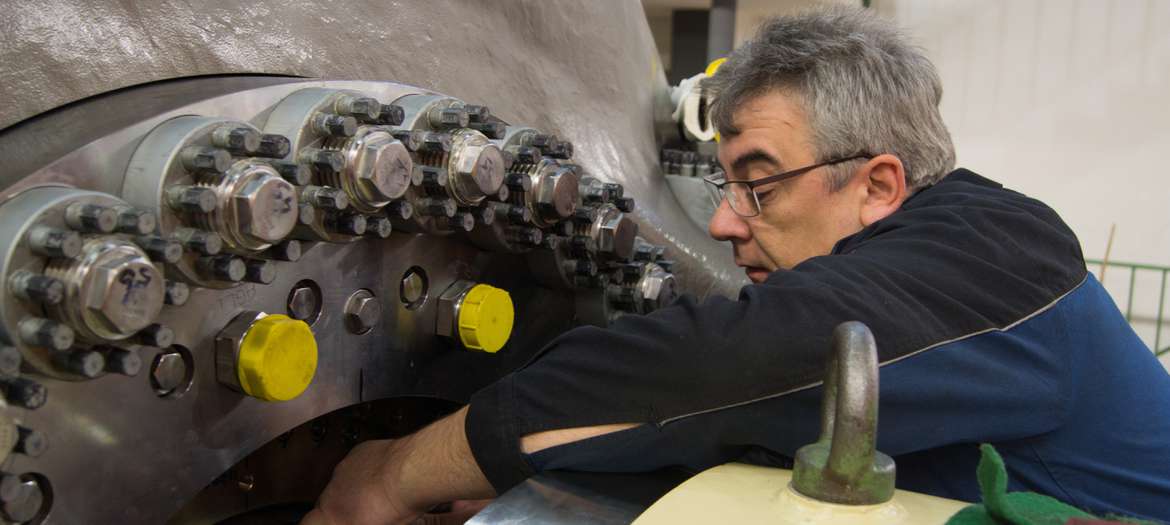Situation
To redesign a mechanical seal for the drive and non-drive side of the pump shaft
Split mechanical seals for high-performance storage pump

To redesign a mechanical seal for the drive and non-drive side of the pump shaft
A large shaft diameter, extreme dynamic and static pressures, and cramped installation situation
The mechanical seal VGH, where all seal components are split
The Fragant power plant group located in the Möll valley of the Tauern mountains in Austria is operated by Kärntner Elektrizitäts AG (KELAG). It is the company's core for generating power and a mainstay for safe and reliable power supply in the federal province of Carinthia.
The power plant group consists of six large and several smaller alpine reservoirs, seven storage power plants and three run-of-the-river power plants. The total output is approx. 474 MW, which generates approx. 840 million kWh electricity each year.
During phases of low network utilization, the storage pump "Oschenik 1" in the Innerfragant power plant delivers water to the Oscheniksee reservoir located at an altitude of 906 m. In case of high power demands, the water is used to cover peaks.
Andritz Hydro, Graz, one of the leading suppliers of equipment for hydroelectric power generation, received an order from KELAG to renew the Oschenik 1 machine unit and replace the 1968 pump with a much more powerful and larger model.
The Oschenik pump project included hydraulics, design, calculation, testing, production, assembly and commissioning. The operator's requirement was a considerable boost in efficiency which was to be achieved, for example, by increasing the flow rate by approx. 18 %. This was implemented by means of a horizontally split 6-stage storage pump.
Operating parameters - pump:

Andritz Hydro commissioned EagleBurgmann to design, calculate, produce, test and assemble a mechanical seal on the drive and non-drive side of the pump shaft. The fully split seal of the HGH/VGH series was the right choice for this application.
Split mechanical seals for pumps are used where it is difficult to assemble the seal. The seals are designed as partial or full axial split which enables them to be mounted directly on the shaft of the completely installed pump. In the case of the semi-split EagleBurgmann HGH, the housing parts are split and the inner parts are not split during initial assembly. With the fully split EagleBurgmann VGH, all seal components are split. Both types of seals are in very reliable use in large pumps in a wide variety of water projects worldwide.
The mechanical seals for the Oschenik storage pump were redesigned on the basis of FEM calculations and optimized for the extremely dynamic and static pressures. The typical pressure operating limit of the VGH is 8 bar (116 PSI) for a diameter of 450 mm (17.72"). However, the requirement for the new storage pump was 50 bar (725 PSI) static with a diameter of 560 mm (22.05").
A particular challenge was to maintain the stability of the split seal housing and especially the metal-to-metal sealed coupling joint under the high pressure. This required the inclusion of structure mechanics (leakage, strength, screws, deformation at the joints, etc.) and sliding face design (lift-off behavior, leakage) in the complex calculations.
Operating parameters - seal:
The seals were tested on the large test facility of EagleBurgmann at 27 … 42 bar (392 … 609 PSI) in dynamic operation at 750 min–1 and static at 50 bar (725 PSI). The customer released the seals in March 2016.
Both seals were installed in December 2016 by EagleBurgmann installation engineers from Austria and Germany, and the pumps and seal system were put into operation in January 2017.
Seal materials:

Between June 2017 and March 2019 the Hengli Group constructed an integrated refining and chemical complex in the Chinese harbor town Dalian where 20 million tons of crude oil are processed every year. EagleBurgmann advised the company Hengli concerning the selection of mechanical seals and supply systems for the whole plant and supplied more than 95 % of the components in use.

In Great Britain, a shortage in natural gas supply has severe consequences: Since the country switched from coal-fired to gas-fired power stations, a gas supply shortage makes households and industrial consumers not only vulnerable to failing heating and gas stoves, but also to power outages. Companies along the value and transportation chain of natural gas are therefore especially dependent on reliable equipment.

Things get hot in rotary kilns, very hot in fact. In the production of cement, for example, the thermometer measures more than 1,000 degrees Celsius. Sealing systems from EagleBurgmann, a company of the Freudenberg Group and EKK, make sustainable contributions to environmental protection, energy efficiency and process reliability under these "fiery" high-temperature conditions.

Our modern civilization is quite literally built upon cement. Today, building materials made from cement are used in buildings, roads, bridges, dams etc. Cement production is a heat-intensive process and causes thermal expansion in duct systems. To compensate this, Indian cement producer Ramco Cement needed fabric expansion joints with a diameter of several meters for two of their plants. On the basis of a close collaboration, EagleBurgmann was able to design components that increase the efficiency of the plant in the long run.

Frequent starts and stops are a severe test for gas-lubricated compressor seals. Installed in an Argentinean combined cycle power plant is an EagleBurgmann supply system that provides a continuous gas flow rate for the seals and adapts it to changing conditions. Since then, the operational reliability of the compressors has increased significantly.

Seals are a risk factor in the production of liquid crystals. If there is even the slightest contamination of the liquid crystals, this will later affect the image quality of the display. Read on to see which sealing solution Merck KGaA uses in paddle dryers for the production of liquid crystals.